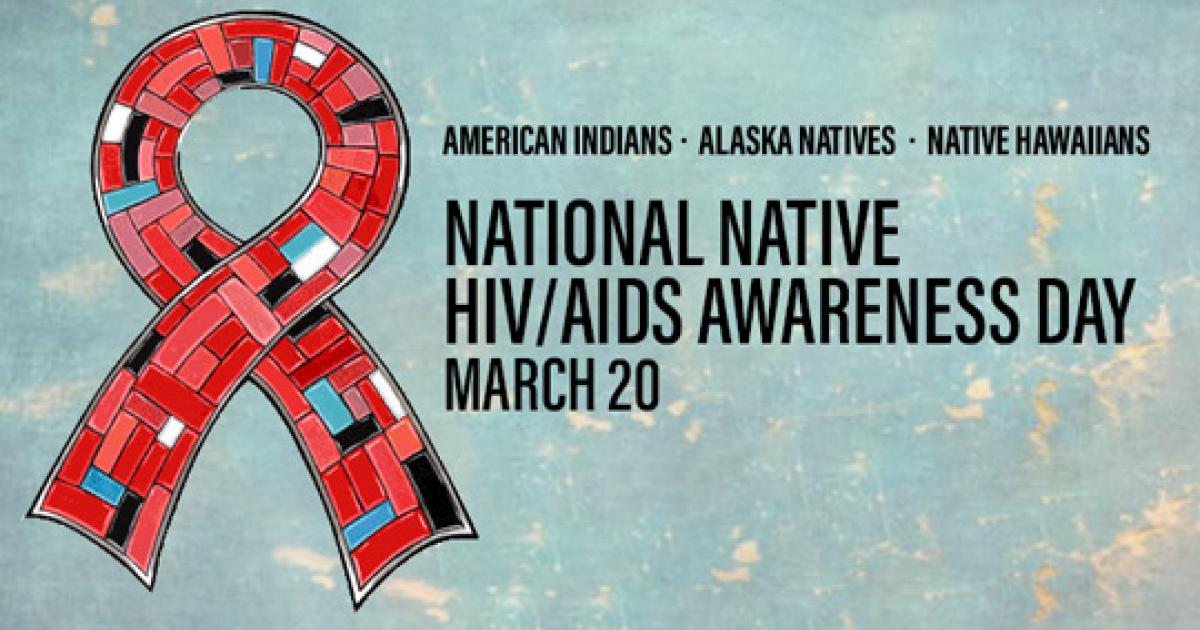Raise awareness about HIV and AIDS on National Native HIV/AIDS Awareness Day (NNHAAD) – March 20th. NNHAAD is celebrated every year on the day of the Spring Equinox – a time of equality, balance, and new beginnings.
HIV in Native Communities
In 2017, of the 38,738 HIV diagnoses in the United States, 1% were among American Indian/Alaskan Native populations (CDC, 2019). From 2012-2016, there has been a 34% increase in HIV diagnoses among American Indian/Alaskan Native (CDC, 2019).
What is HIV/AIDS?
HIV stands for human immunodeficiency virus. This virus is spread when infected bodily fluids like semen, vaginal fluid, blood, or breast milk enter another person’s body. The virus attacks the cells in our body that usually protect us from illness. After some time, the virus makes our immune system weak and our body is no longer able to fight off sickness. AIDS stands for acquired immunodeficiency syndrome. AIDS is the most advanced stage of HIV. There is no cure for HIV but there are medications that can help those with HIV live long lives.
How do you get HIV?
HIV is mainly spread through unprotected sexual contact, like vaginal, anal or oral sex. HIV can also be spread by sharing needles. HIV can be spread from mother to baby during delivery or breastfeeding. Saliva, sweat, and tears will not cause an HIV infection. So kissing, holding hands, hugging, sharing drinks, and sitting on toilets will not cause an HIV infection.
How can you reduce your risk of HIV?
Use condoms correctly every time you have sex. Condoms are highly effective in preventing the spread of sexually transmitted infections and HIV. If you use needles, do not share them. Get tested and know your HIV status. It is important to get tested regularly and each time you start a new relationship. The CDC recommends that everyone aged 13-64 get tested for HIV at least once. Those with a higher risk should get tested at least once a year. Visit cdc.gov/hiv/basics/testing.html to see if you are high risk.
Other Resources
- Forest County Potawatomi Community Health’s Brown Bag Program provides discreet bags containing condoms and instructions. Simply stop by Community Health located in the Stone Lake Health & Wellness Center and ask for a brown bag.
- HIV and American Indians/Alaskan Natives Fact Sheet: www.cdc.gov/hiv/pdf/group/racialethnic/aian/cdc-hiv-natives.pdf
- HIV Risk Reduction Tool: wwwn.cdc.gov/hivrisk/
- WeRNative HIV/AIDS Education: www.wernative.org/articles/hiv-aids
- Wisconsin HIV/AIDS Hotline – (800) 334-2437
Sources
American Indians and Alaska Natives. Centers for Disease Control and Prevention. https://www.cdc.gov/hiv/group/racialethnic/aian/index.html. Published November 12, 2019. Accessed January 22, 2020.
National Native HIV/AIDS Awareness Day. Centers for Disease Control and Prevention. https://www.cdc.gov/features/nativehivaids/index.html. Published March 19, 2019. Accessed January 22, 2020.

